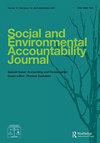从头开始构建:开发社会报告模型的自动人种学方法
Q2 Business, Management and Accounting
Social and Environmental Accountability Journal
Pub Date : 2020-05-03
DOI:10.1080/0969160x.2020.1765825
引用次数: 2
摘要
摘要本文介绍了拉丁美洲社会报道模式的发展过程。该模型名为“价值足迹”(VF),由路易斯·佩雷拉·阿尔达玛创建,当时他是四大审计公司BigOne智利办事处的合伙人。VF社交报告工具解释了公司如何创造和分配价值,类似于其他增值报表模型。VF已经在哥伦比亚、墨西哥、智利和乌拉圭的20多家大公司使用了15年。Luis是本文的合著者之一,他通过将这个故事置于文化和历史背景中的丰富描述,讲述了社会报道模式是如何实际创建的内幕。本文探讨了自动民族志的使用,这是一种相对较新的社会科学研究方法,在会计中很少使用。这种独特的方法有助于读者反思从这一经验中获得的教训及其对社会会计未来发展的影响,特别是在新兴市场。本文章由计算机程序翻译,如有差异,请以英文原文为准。
Building from Scratch: An Auto-ethnographic Approach for the Development of a Social Reporting Model
ABSTRACT This paper presents an auto-ethnographic account of the development of a social reporting model in Latin America. This model, named ‘Value Footprint’ (VF), was created by Luis Perera Aldama while partner at the Chilean office of BigOne, a Big Four audit firm. The VF social reporting tool explains how companies create and distribute value, similarly to other Value Added Statements models. The VF has now been in use for over 15 years in more than 20 large companies in Colombia, Mexico, Chile, and Uruguay. Luis, one of the co-authors of this paper, narrates the inside story of how a social reporting model is actually created, by presenting a thick description that places this story in its cultural and historical context. This paper explores the use of Auto-ethnography, a relatively new research method in social sciences, which has rarely been used in Accounting. This unique approach helps the reader to reflect on the lessons gained from this experience and its implications for future developments in social accounting, particularly in emerging markets.
求助全文
通过发布文献求助,成功后即可免费获取论文全文。
去求助
来源期刊

Social and Environmental Accountability Journal
Business, Management and Accounting-Accounting
CiteScore
3.90
自引率
0.00%
发文量
16
期刊介绍:
Social and Environmental Accountability Journal (SEAJ) is the official Journal of The Centre for Social and Environmental Accounting Research. It is a predominantly refereed Journal committed to the creation of a new academic literature in the broad field of social, environmental and sustainable development accounting, accountability, reporting and auditing. The Journal provides a forum for a wide range of different forms of academic and academic-related communications whose aim is to balance honesty and scholarly rigour with directness, clarity, policy-relevance and novelty. SEAJ welcomes all contributions that fulfil the criteria of the journal, including empirical papers, review papers and essays, manuscripts reporting or proposing engagement, commentaries and polemics, and reviews of articles or books. A key feature of SEAJ is that papers are shorter than the word length typically anticipated in academic journals in the social sciences. A clearer breakdown of the proposed word length for each type of paper in SEAJ can be found here.
 求助内容:
求助内容: 应助结果提醒方式:
应助结果提醒方式:


